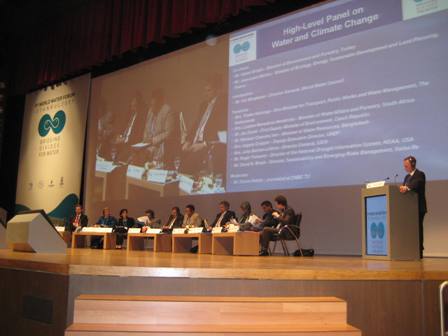The interdependencies between land, water and human society, the pressure of increasing water demand and resulting conflicts, and the greater uncertainty in global environmental and hydro-climatological conditions, underline the urgency of establishing a participatory ecosystem-based catchment management approach.
Work Across Scales to Connect
From the irrigation furrow to the river basin, water cuts across many scales. Water managers must recognise water’s natural hydrological division into basins. However, decisions are made by political jurisdictions – from villages to nations – that may cause conflict with other jurisdictions and disruptions in other parts of a water basin. Water resource management must link decision makers at different levels by fostering communication and by creating platforms for dialogue and negotiation throughout the basin.
In many projects, WANI organizes micro-watershed committees of three or four villages that share water in the tributaries, multi-stakeholder dialogues where hundreds of people with a stake in the watershed come to express their views, and high-level negotiations where ministers sign international agreements. All of these scales are necessary to good water management.
Projects: Basim, Himal – Hindu Kush, Huong River Basin, Komadugu Yobe River Basin, Mekong River Basin, Pangani River, Tacana Project, Lake Tanganyika, Volta River Basin
Stories from the field:
- Mekong dialogues – The Mekong River touches thousands of communities and millions of people. An IUCN project fosters greater participation and transparency in water-related decision-making processes in the region.
- Guatemala grassroots organizing – IUCN works with existing Community Development Councils to access talent and funds for watershed projects.
- The fisherman’s tale – A Hausa elder in Nigeria rejoices when a WANI water audit confirms the traditional wisdom about the Yobe River and treks to regional meeting to promote restoration of its fishery.
- Process management is the key to dialogue – In Tanzania’s Pangani basin, an umbrella committee provides a platform for coordination and dispute settlement among smaller water user groups, some of which had previously resorted to violence to settle arguments.
- Coordination of river basin management across multiple scales, sectors and stakeholders – A project in Botswana’s Okavango Delta attempts to resolve differences between local commercial fishermen and tourist sport fishing guides by appealing to both to see the big picture of the delta ecosystem.
- Rio-C-Mas and groups – A regional umbrella organization provides legal status and training for indigenous groups then moves to provide emergency assistance when necessary.
Related WANI Toolkits:
NEGOTIATE: Chapter 2 - Constructive Engagement, Chapter 3 - Multistakeholder Platforms, Chapter 4 - Consensus Building
PAY: Chapter 4 - Roadmap towards Agreement, Chapter 6 - Learning from Partners and Experience
RULE: Chapter 4 - Building a Sound Institutional Mechanism
SHARE: Chapter 2 - Why Share? The Benefits (and Costs) of Transboundary Water Management, Chapter 3 - Stakeholders in Benefit Sharing and the Management Process
